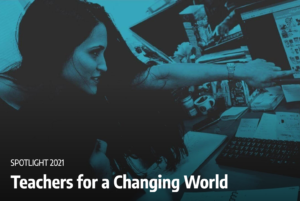Aristotle, Socrates, Plato, Montessori, Helen Keller… books tell us that the history of civilisation is built on the names of a few remarkably famous teachers who we all know and applaud. Those who inspired great heroes and achieved incredible feats. The reality is, however, that behind these chosen few, the real history of humanity is paved with the names of millions of anonymous teachers. Those who inspire many children to do great things every day.
Having quality teachers is the most important and decisive element in children’s learning and well-being. The World Bank has stated, and several studies show that the difference between a poor-quality teacher and an excellent one can increase (or decrease) learning over several years. They also say that good teachers have a substantial impact on children’s well-being, not only having an influence on their academic achievement, but also on their social future and their long-term employment.
However, in many countries there is a lack of teachers, and where there are teachers, there is a lack of training. For example, a recent study carried out by the World Bank in seven sub-Saharan African countries, showed that almost a quarter of primary school teachers don’t know how to subtract two-digit numbers and a third can’t multiply two-digit numbers. We know that the most successful education systems, such as Singapore and Finland, have support, training and incentive policies for teachers. As a result, they have well-prepared and motivated teachers to boost their students’ learning.
Today, more than ever, we need trained teachers who go far beyond the old-fashioned mere conveying of knowledge to the children. We need teachers who are motivated and able to motivate; who can handle new pedagogies and are able to activate the desire to learn in their students with the support of technology; teachers who encourage creativity, critical thinking, teamwork, empathy and resilience; who are able to adapt quickly to a rapidly changing context.
So, how do we “build” these teachers? Without a doubt, we know that public policies are needed to properly prepare, train, support and motivate teachers. But we also know that the professional development of teachers can be leveraged through the use and application of technology.

In this context, the international organisation HundrED, in collaboration with the World Bank and the Global Partnership for Education (GPE), have published the report Teachers for a Changing World Spotlight, an initiative that presents a list of the most impactful and scalable teacher professional development technology solutions in the world, including, incidentally, the ProFuturo programme. The selection was made from a total of 400 programmes from 80 countries. Would you like to know what they are?
- Atenea Community (Varkey Foundation), – Atenea Community is a free social network aimed to provide professional development to Latin American teachers and it is based on collaborative learning.
- Inspiring Teachers, United Kingdom.- Inspiring Teachers is a peer-based coaching platform that helps schools and their headteachers and supports their teachers by encouraging peer-to-peer training to make the leap from being good to becoming excellent.
- LeadNow!, Kenya.- Designed for environments with a lack of technology and resources, LeadNow! uses remote training and coaching tools to equip teachers with the new skills and mindset they need to support the achievement and well-being of their students in the face of continuous changes to the system. · OneSky, China.- OneSky empowers communities and caregivers through an innovative blended learning approach that provides quality early care and education to harness the potential of vulnerable young children in China, Vietnam and Mongolia. · PerformEd, Egypt.- PerformEd accelerates learning productivity by recording learning in real time and providing instant feedback to teachers. This creates a positive feedback loop that empowers teachers in the context of their professional development.
- Educational Bridges, Chile.- Educational Bridges is a teacher training project which aims to contribute to improving the teaching-learning processes in the country’s public schools. Through workshops, they promote a pedagogical strategy based on the application of 21st-century skills in education along with the systematic planning of classroom activities. In addition, they provide mobile technology and digital educational resources to support and complement the teachers’ work in the classroom.
- Teach2030, United Kingdom.- Teach2030 offers contextualised, easy-to-use, easy-to-scale, digital professional development courses which help teachers working in the world’s most challenging environments to improve their teaching. · Your class, your country, Chile.- A non-profit professional organisation which advocates for the revaluation of the teaching profession in Latin America, through a life-long, personalised and collaborative professional development strategy which is connected to practice, combining face-to-face learning with virtual learning experiences. · Global School Leaders, India.- Global School Leaders provides professional development for school leaders, combining in-situ training, participatory workshops and peer-based exchanges to transform the approach of educational leaders from management to improving students’ learning.
- ProFuturo, – Last but not least, our own digital education programme, which this Observatory forms a part of. A joint project from the Telefónica Foundation and the La Caixa Foundation, which aims to reduce the educational gap in the world by improving the quality of education for millions of children in vulnerable environments. ProFuturo combines teacher training, classroom experiences and educational resources for primary school children to incorporate the efficient and sustainable use of technology in their classrooms. To do so, it provides pedagogical and technical support to teachers and schools, as well as systematic monitoring and evaluation to measure the scope and functioning of the programme, ensuring the continuous improvement and management of the programme’s learning outcomes in more than 40 countries.
These initiatives demonstrate the importance of teacher training in the disruptive transformation needed by education, a transformation that will be impossible without the proper inclusion of technologies in the classroom and in school communities. It also highlights the urgency of scaling up the core aspects of all these innovative practices. Namely: globalising collaborative and networked work among teachers; consolidating distributed leadership among them; promoting meaningful classroom experiences; boosting metacognition and feedback; and, in short, incorporating everything that really works in order to ensure we have empowered and transformative teachers that society needs.






